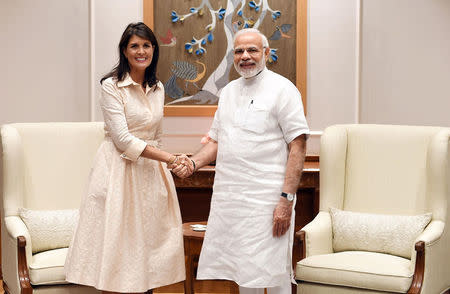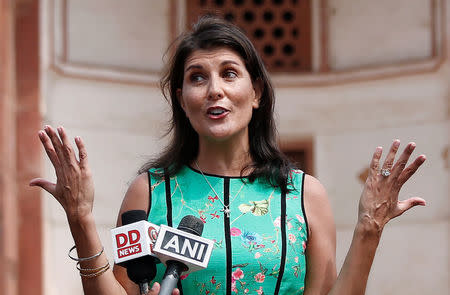U.S. says India talks 'a priority' after postponing twice
By Michelle Nichols and Sanjeev Miglani
NEW DELHI (Reuters) - U.S. Ambassador to the United Nations Nikki Haley said on Thursday that a top-level strategic dialogue with India will take place as soon as possible, after Washington put off the meeting for a second time in months.
The talks were expected to cover issues including U.S. sanctions against Russia and Iran, arms sales and trade.
India and the United States have built close political and defence ties and U.S. Secretary of State Mike Pompeo and Defense Secretary Jim Mattis were due to hold joint talks with their Indian counterparts in Washington on July 6.
But Pompeo called Indian Foreign Minister Sushma Swaraj on Wednesday night to say that the United States had to postpone the meeting because of unavoidable reasons, the Indian foreign ministry said.
The so-called two-plus-two talks are the highest level of dialogue between the United States and India and were agreed by U.S. President Donald Trump and Indian Prime Minister Narendra Modi last year.
Haley, who is on a visit to New Delhi, told Reuters that the talks were a priority and would happen soon.
"It’s not just that it’s going to happen, they are now willing to come here if they need to, or travel to make sure the two plus two happens. It is a priority. It’s something that needed to happen. It’s important," she said.
No new dates have been announced.
The meeting was originally planned for April but had to be put off because Trump fired Secretary of State Rex Tillerson the previous month and Pompeo went through confirmation hearings before the U.S. Congress.
Among the issues on the agenda for next week's talks were arms sales including the transfer of Sea Guardian surveillance drones to the Indian navy, the first such sale of unmanned aircraft.
'MAJOR PRIORITY'
Haley said the ministers would discuss how Washington can continue to support India "as a provider of regional security, particularly in and around the Indian Ocean."
"These discussions will undoubtedly involve issues like joint exercises and military hardware and technology. But the strategic partnership we hope to build is bigger and more durable than that," Haley told the India Observer Research Foundation think-tank in New Delhi.
Indian officials also planned to discuss the issue of sweeping U.S. sanctions on Russia under which any country engaged with its defence and intelligence sectors could face secondary U.S. sanctions.
The U.S. move has threatened a proposed $6 billion air defence missile deal that India is negotiating with Russia to help it counter the ballistic missiles and stealth aircraft that China is developing.
Haley, a member of Trump's cabinet, said the postponement of the meeting in Washington had nothing to do with any policy issues.
“The meeting is being discussed right now and being rescheduled as soon as possible. It was a situation that couldn’t be avoided and it will come out publicly in the next few days,” she said.
Trade differences between the United States and India are also increasing. Last week, New Delhi raised duties on U.S. farm products in retaliation against Trump's tariff hikes on steel and aluminium.
The U.S. embassy said in a statement that Washington remained committed to a strong relationship with India. "The U.S.-India partnership is a major strategic priority for the Trump administration."
The United States also wants India to cut oil imports from Iran following the reimposition of sanctions that had been suspended under a nuclear accord.
"In years to come I am confident that the United States and India will stand shoulder to shoulder in many ways to confront the challenges of the Indo-Pacific region and the world,” Haley said. “Too much is at risk if we fail to do so.”
(Editing by Robert Birsel)


